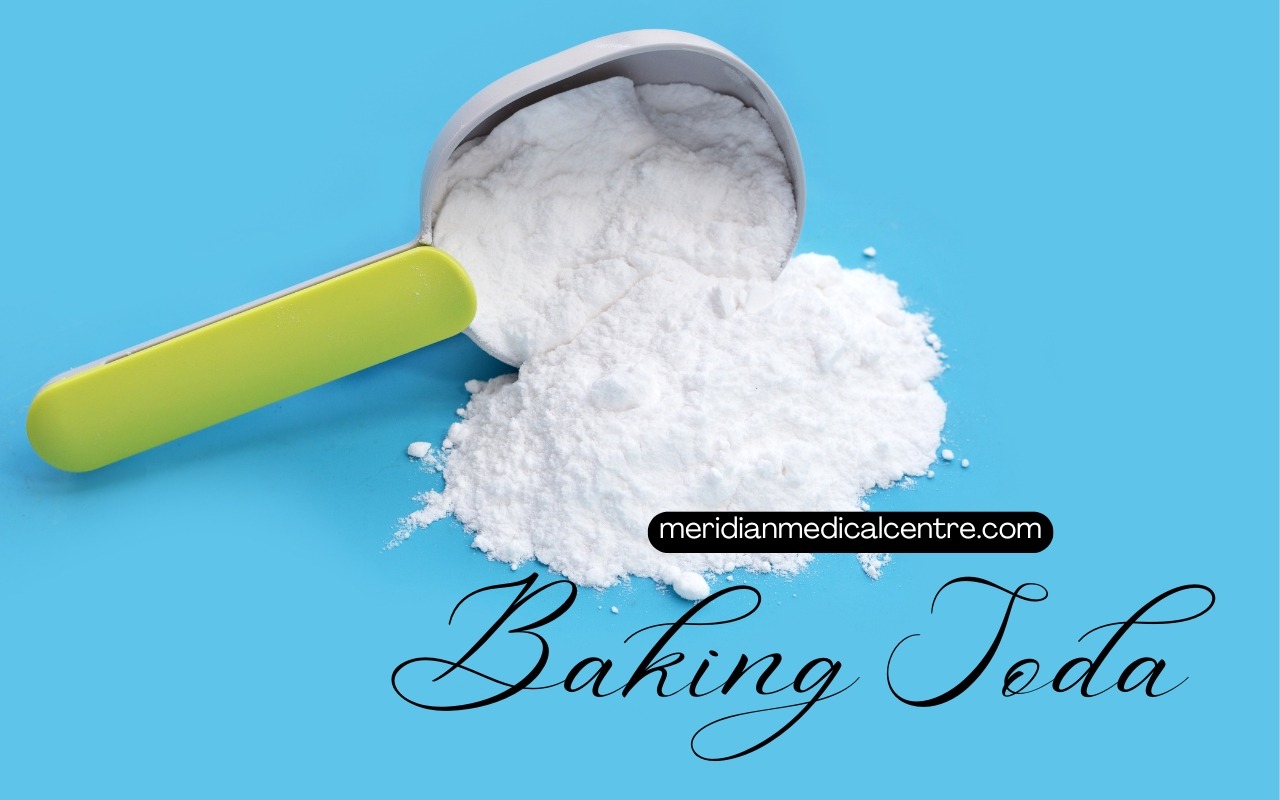
Meridian Medical Centre provides evidence-based, informative content on natural wellness approaches that complement clinical care. Our focus is on empowering individuals to make informed health choices, with content rooted in scientific research and professional expertise. While we recognize the role of holistic health solutions, we emphasize the importance of consulting healthcare professionals for personalized medical guidance. Our approach is ethical, transparent, and accessible, ensuring that readers receive trustworthy health information that integrates natural and clinical solutions for better health outcomes.
Understanding Baking Soda and Weight Loss Claims
Baking soda (sodium bicarbonate) has gained traction on social media platforms like TikTok as a purported weight loss aid. Advocates claim that adding a small scoop of baking soda to water—a practice called “soda loading”—can enhance endurance, aid digestion, reduce acid reflux, and even support weight loss. However, does the scientific evidence support these claims? More importantly, is this practice safe?
This article evaluates the potential benefits and risks of baking soda in relation to weight management and overall health, based on a data-driven approach.
What is Baking Soda and How Does It Work?
Baking soda is an alkaline compound composed of sodium, hydrogen, carbon, and oxygen. It has various applications, ranging from a cooking ingredient and cleaning agent to a common component in antacids. When dissolved in water, it releases bicarbonate ions, which can neutralize acid and regulate pH levels in the body.
Can Baking Soda Aid in Weight Loss? Examining the Evidence
Despite social media claims, there is no scientific evidence to suggest that baking soda directly contributes to weight loss. Unlike thermogenic agents or metabolism-boosting compounds, baking soda does not increase calorie burning, fat oxidation, or metabolic rate. The only possible connection between baking soda and weight loss is its potential to cause temporary bloating and gastrointestinal discomfort, which may reduce appetite—but this is not a sustainable or healthy weight loss method.
1. Alkalizing Effect and Metabolism
Some proponents argue that baking soda’s alkalizing properties create an internal environment that promotes fat loss. However, the body's pH is tightly regulated, and food or supplements have minimal impact on overall systemic pH. No clinical studies support the idea that altering blood pH through baking soda consumption accelerates weight loss.
2. Appetite Suppression via Gastric Distress
Baking soda can cause bloating and discomfort due to its reaction with stomach acid, leading to gas production. Some individuals may experience reduced appetite due to nausea or gastrointestinal distress, but this is not a viable or safe weight loss approach.
3. Improved Exercise Performance
While baking soda is not a fat burner, it has been studied for its ergogenic effects in sports and fitness. Research published in the International Society of Sports Nutrition (2021) suggests that baking soda may enhance performance in high-intensity exercises lasting up to 12 minutes by buffering lactic acid buildup. A separate study found that participants who consumed baking soda pre-workout performed more repetitions with less fatigue.
Although improved exercise endurance can indirectly support weight loss, baking soda itself does not lead to fat reduction—only increased physical activity does.
Risks and Side Effects of Baking Soda Consumption
While baking soda has some potential benefits, excessive or frequent consumption can lead to serious health complications, including:
- High Sodium Intake: A teaspoon of baking soda contains approximately 1,200 mg of sodium, nearly half the recommended daily intake. Chronic high sodium consumption is linked to high blood pressure, kidney damage, and cardiovascular disease.
- Metabolic Alkalosis: Overconsumption of baking soda can result in metabolic alkalosis, a condition where blood pH becomes excessively alkaline (above 7.45). Symptoms include muscle twitching, confusion, nausea, vomiting, and, in severe cases, reduced oxygen flow to tissues.
- Gastrointestinal Distress: Baking soda reacts with stomach acid, producing carbon dioxide gas, which can lead to bloating, cramps, and diarrhea.
- Electrolyte Imbalance: Sodium bicarbonate can interfere with potassium and calcium balance, leading to muscle weakness and irregular heart rhythms.
Baking Soda’s Role in Other Health Conditions
1. Acid Reflux and Indigestion
Baking soda has a well-documented role as an antacid, helping to neutralize stomach acid and relieve symptoms of heartburn and indigestion. A 2022 review confirmed its effectiveness in reducing stomach acidity; however, long-term use is not recommended, as it can impair normal digestive function and lead to acid rebound (where the stomach produces even more acid to compensate).
2. Kidney Disease Management
A study published in the American Journal of Medicine (2021) found that daily bicarbonate supplementation may slow the progression of chronic kidney disease (CKD) by reducing acid load on the kidneys. However, this is relevant only for individuals with existing CKD under medical supervision—baking soda does not prevent kidney disease in healthy individuals.
Should You Use Baking Soda for Weight Loss?
Based on the current body of scientific evidence, baking soda does not support weight loss in a meaningful or sustainable way. While it may have applications in athletic performance and acid regulation, its risks outweigh any potential benefits for weight management. Instead of relying on unproven trends, individuals seeking weight loss should focus on evidence-based strategies such as:
- Balanced Nutrition: Prioritize whole foods, lean proteins, healthy fats, and fiber-rich carbohydrates.
- Regular Physical Activity: Engage in resistance training and aerobic exercises to increase calorie expenditure.
- Hydration and Sleep: Optimize water intake and maintain adequate sleep for metabolic health.
- Medical Supervision: Consult a healthcare professional before trying new dietary strategies or supplements.
Conclusion
Despite widespread claims on social media, baking soda is not an effective or safe weight loss tool. While it has proven applications in exercise performance enhancement, acid reflux relief, and kidney disease management, its use for weight loss is unsupported by research. The best approach to sustainable weight loss involves nutritional balance, physical activity, and evidence-based lifestyle habits—not quick-fix trends with potential health risks.
For individuals considering baking soda for wellness purposes, consulting a qualified healthcare provider is crucial to ensuring safety and effectiveness. As with any health-related decision, scientific evidence should guide choices, not social media trends.